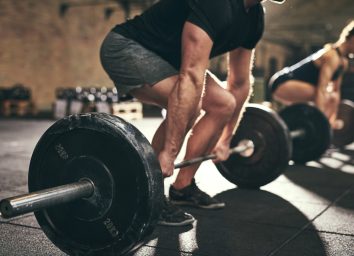Ugly Side Effects of Not Stretching After Exercise, Says Science
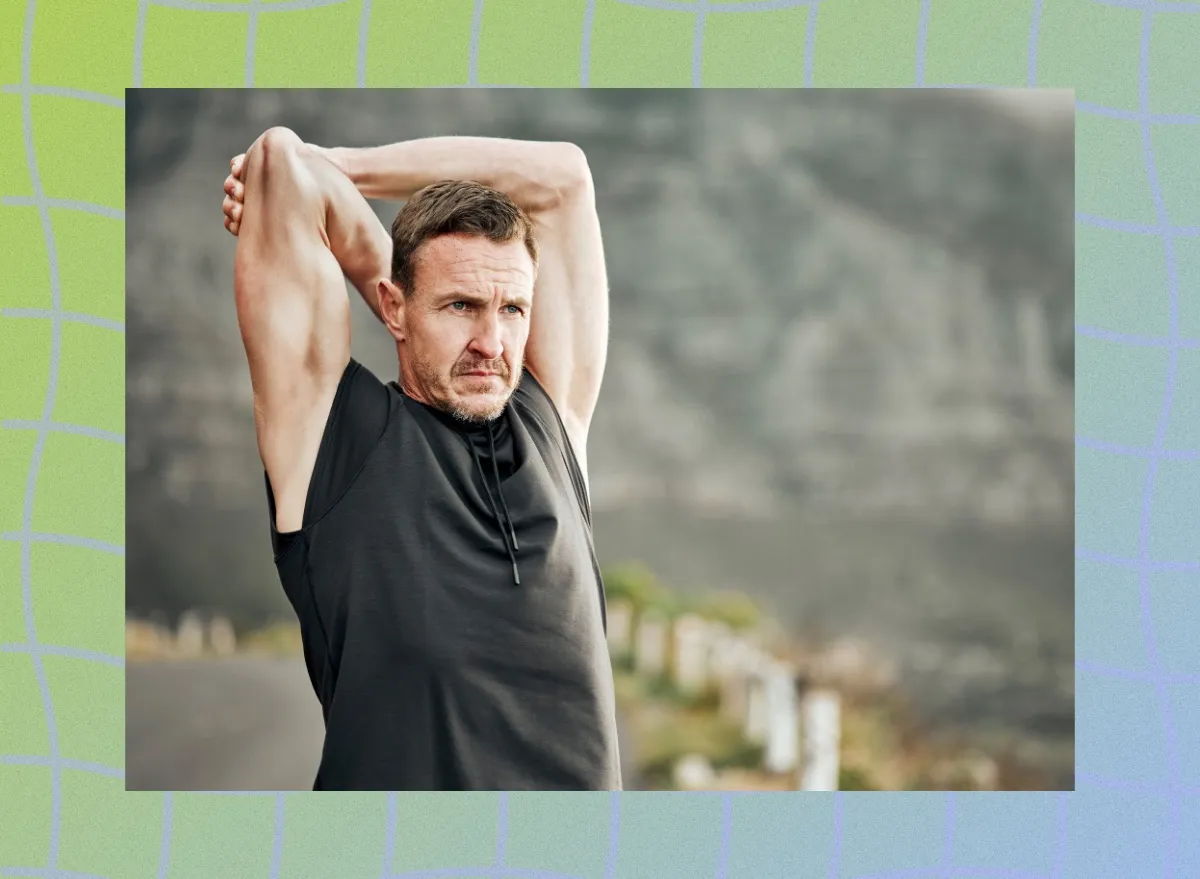
Far too many people—even hardcore exercisers—view stretching as an annoying and optional chore for bookending their workouts. Even worse, it's something that they'll skip after exercise for no other reason than they can't be bothered to actually do it. After all, you've just run a few miles or completed a totally killer HIIT circuit—and your body feels warm, loose, and great—so who cares about going through a tedious stretching routine?
Well, we all should. Science shows that stretching isn't actually literal—you're not even "stretching" your muscles at all. In fact, the true purpose of stretching is to lengthen and mobilize the connective tissue around your muscle, which does wonders for both your joints and your muscles. What's more, stretching helps your blood flow, reduces your risk of injury, helps you lose weight, and—as millions of yoga practitioners across the world will tell you—even relieves your stress.
You've probably heard a million times that stretching is crucial after a workout. Well, newsflash: It's true. Whether you've just rowed 20 minutes on an erg, you've been walking the steps at your nearest high-school football stadium, or you've gone through an amazing weightlifting routine, it's crucial for you to take a few minutes to stretch after sweating. If you don't, it doesn't do your body any favors. For more on what happens to your body when you skip your post-exercise stretching, read on. And for more on the benefits of loosening up, see here for The Side Side Effect of Stretching Before Breakfast, Say Experts.
You Could Feel Sick

You won't be surprised to know that when you exercise, you raise your heart rate for a period of time. While it's great to get that blood flowing, the experts at Austin Physical Therapy will tell you that it's just as important to "get your heart rate back to a normal level after the workout is over." This is also known in the fitness world as "cooling down."
"After physical activity, your heart is still beating faster than normal, your body temperature is higher and your blood vessels are dilated," write the health experts at the American Heart Association. "This means if you stop too fast, you could pass out or feel sick. A cool-down after physical activity allows a gradual decrease at the end of the episode." And for some great workouts to try, see here for the 5-Minute Fat-Melting Workout That's the Best Way to Start Your Day.
Your Muscles Will Likely Become Stiffer and More Sore
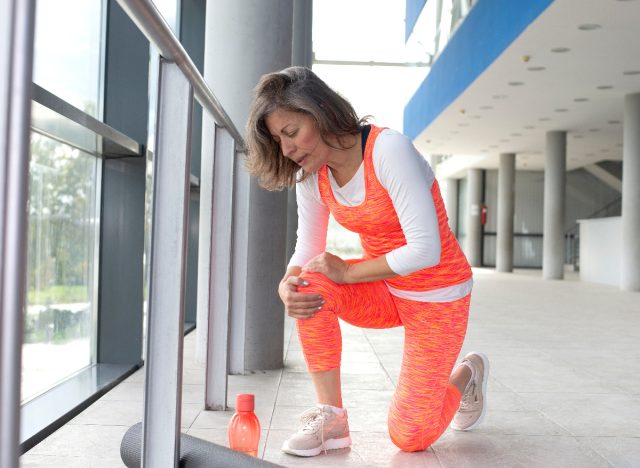
When you exercise your muscles, it produces an inflammatory response in the form of lactic acid, which is actually what causes your muscles to become sore. When you rest—or "recover"—in the time between bouts of exercise, your body naturally breaks down and gets rid of that lactic acid. One thing that helps your body dispose of that lactic acid? You guessed it: Stretching. Stretching helps your distribute oxygen throughout your body and muscles, which, according the Healthline, "can reduce lactic acid production and rid your muscles of any accumulation of lactic acid."
At the same time, stretching right after exercise will also relax what are guaranteed to be stiffer muscles that are far more likely to cramp. And for some clever ways to work your muscles more every day, don't miss The Secret Trick for Getting Fit Using Your Toothbrush.
You'll Be at Risk of Sub-Optimal Range of Motion and Injury
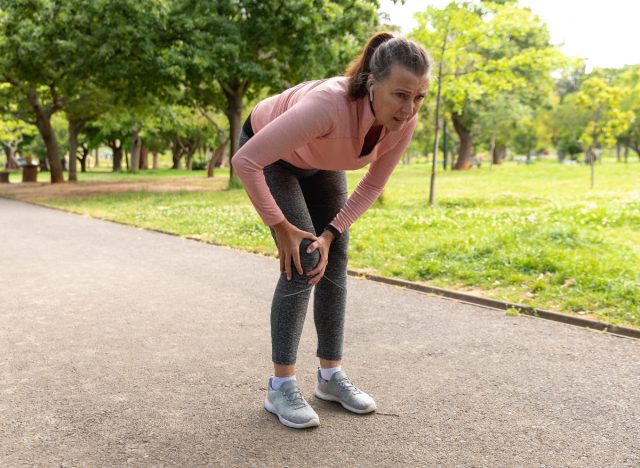
Having poor flexibility isn't good for your body. According to the experts in the sports medicine department at UC Davis Health, inflexibility will cause you to have muscles that tire quicker and joints that are more prone injury, it will lead to "abnormal stress on structures and distant from the initial site of inflexibility" (noting that tendonitis in the knee can be the result of tightness in the calf), and your weakened range of motion will lead to less blood and nutrients to your joints. In the case of the latter, it's why people often feel stiffness and pain in their "weight bearing" joints, such as the knees and hips.
Put simply: "Stretching after you exercise helps optimize the range of motion about your joints and boosts circulation," write the leading health experts at The Mayo Clinic.
Remember: You've Got to Stick to It
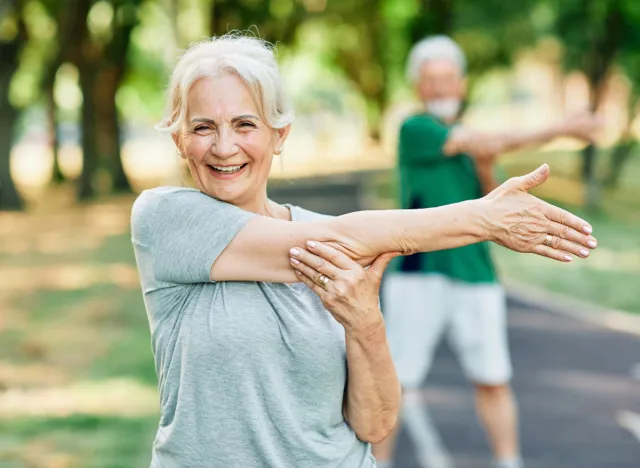
"It may have taken you many months to get tight muscles, so you're not going to be perfectly flexible after one or two sessions," physical therapist David Nolan, of Massachusetts General Hospital explained to Harvard Medical School. "It takes weeks to months to get flexible, and you'll have to continue working on it to maintain it."
Also, the Mayo Clinic says that it's important to "keep it gentle" when you stretch. "Breathe freely as you hold each stretch," they write. "Try not to hold your breath. Don't bounce or hold a painful stretch. Expect to feel tension while you're stretching. If you feel pain, you've gone too far."
They offer this as a great example of a cool down you can do after a tough workout:
Step one: "Walk for about 5 minutes, or until your heart rate gets below 120 beats per minute." Step two, moving to stretching: "Hold each stretch 10 to 30 seconds. If you feel you need more, stretch the other side and return for another set of stretching. The stretch should be strong, but not painful. Do not bounce. Breathe while you're stretching. Exhale as you stretch, inhale while holding the stretch." And for more life-changing exercise advice, see here for the Secret Exercise Tricks for Keeping Your Weight Down for Good.

